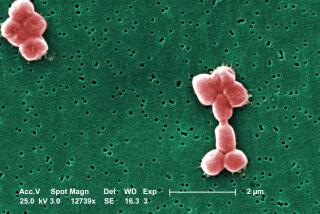Danger from the ‘superbugs’
- Share via
Re “Deadly ‘superbug’ infections spread,” Oct. 17
Those who do not believe in evolution, take note.
Ross Billings
Corona del Mar
--
The alarming reports in the Journal of the American Medical Assn. outlining the extent of two “superbug” infections should chasten those who call for ever-more-stringent regulation of pharmaceutical companies and their products.
Drug research is already under the gun from over-regulation: It typically takes more than 10 years and $1 billion to get a new drug to market, and even then the threat of liability for unforeseeable toxicity looms.
Now the need is clearly for new, effective drugs -- antibiotics and vaccines -- to counter the variant germs that increasingly threaten us. These include not only the currently newsworthy methicillin-resistant Staphylococcus aureus and pneumococcus but resistant tuberculosis and other multi-drug resistant infections.
We need stronger weapons against these infections, and incentives must be given to pharmaceutical researchers to create such weapons.
Why should a drug company these days invest so much time and money in research when the Food and Drug Administration puts up obstacles, demanding absolute safety at every turn, and when plaintiffs’ lawyers search for any perceived opening to pick their deep pockets?
Gilbert Ross MD
Medical director
The American Council
on Science and Health
New York
--
The role of animal agriculture in the rising prevalence of methicillin-resistant Staphylococcus aureus (or MRSA) infections has gone widely unreported in the United States. In Europe, however, recent scientific studies have found that pig farmers and their family members are more likely to have MRSA, and that routine use of human antibiotics in animals has contributed to the MRSA epidemic.
With Staphylococcus aureus now killing more Americans than HIV/AIDS, more aggressive action is needed to safeguard the effectiveness of our antibiotics.
A pending congressional bill would phase out the use of those antibiotics that are important in human medicine as animal feed additives within two years.
The American Medical Assn., the Infectious Diseases Society of America and the American Academy of Pediatrics are among more than 350 groups nationwide that have endorsed this bill. This bill should be passed before more lives are lost.
Philip R. Lee MD
Stanford University
Palo Alto
The writer is a former U.S. assistant secretary of Health and Human Services.






